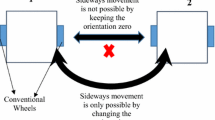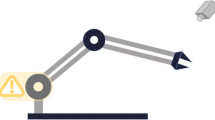Abstract
In this paper, an adaptive observer for robust control of robotic manipulators is proposed. The lumped uncertainty is estimated using Chebyshev polynomials. Usually, the uncertainty upper bound is required in designing observer-controller structures. However, obtaining this bound is a challenging task. To solve this problem, many uncertainty estimation techniques have been proposed in the literature based on neuro-fuzzy systems. As an alternative, in this paper, Chebyshev polynomials have been applied to uncertainty estimation due to their simpler structure and less computational load. Based on strictly-positive-real (SPR) Lyapunov theory, the stability of the closed-loop system can be verified. The Chebyshev coefficients are tuned based on the adaptation rules obtained in the stability analysis. Also, to compensate the truncation error of the Chebyshev polynomials, a continuous robust control term is designed while in previous related works, usually a discontinuous term is used. An SCARA manipulator actuated by permanent magnet DC motors is used for computer simulations. Simulation results reveal the superiority of the designed method.
Similar content being viewed by others
References
Gholipour R, Khosravi A, and Mojallali H, Suppression of chaotic behavior in duffing-holmes system using back-stepping controller optimized by unified particle swarm optimization algorithm, IJE Trans. B: Appl., 2013, 26(11): 1299–1306.
Gholipour R, Khosravi A, and Mojallali H, Parameter estimation of Lorenz chaotic dynamic system using bees algorithm, IJE Trans. C Asp., 2013, 26(3): 257–262.
Gholipour R, Khosravi A, and Mojallali H, Multi-objective optimal backstepping controller design for chaos control in a rod-type plasma torch system using Bees Algorithm, Applied Mathematical Modelling, 2015, 39(15): 4432–4444.
Cheah C C, Liu C, and Slotine J J E, Adaptive Jacobian tracking control of robots with uncertainties in kinematic, dynamic and actuator models, IEEE Transactions on Automatic Control, 2006, 51(6): 1024–1029.
Cheah C C, Liu C, and Slotine J J E, Adaptive Jacobian vision based control for robots with uncertain depth information, Automatica, 2010, 46(7): 1228–1233.
Li G J, Adaptive tracking control for air-breathing hypersonic vehicles with state constraints, Frontiers of Information Technology & Electronic Engineering, 2017, 18(5): 599–614.
Fateh M M, Robust control of flexible-joint robots using voltage control strategy, Nonlinear Dynamics, 2012, 67(2): 1525–1537.
Adhikary N and Mahanta C, Inverse dynamics based robust control method for position commanded servo actuators in robot manipulators, Control Engineering Practice, 2017, 66: 146–155.
Jin M, Kang S H, Chang P H, et al., Robust control of robot manipulators using inclusive and enhanced time delay control, IEEE/ASME Transactions on Mechatronics, 2017, 22(5): 2141–2152.
Fateh M M and Khorashadizadeh S, Robust control of electrically driven robots by adaptive fuzzy estimation of uncertainty, Nonlinear Dynamics, 2012, 69(3): 1465–1477.
Zhai D H and Xia Y, Adaptive fuzzy control of multilateral asymmetric teleoperation for coordinated multiple mobile manipulators, IEEE Transactions on Fuzzy Systems, 2016, 24(1): 57–70.
Tian Q Y, Wei J H, Fang J H, et al., Adaptive fuzzy integral sliding mode velocity control for the cutting system of a trench cutter, Frontiers of Information Technology & Electronic Engineering, 2016, 17(1): 55–66.
Wang F, Liu Z, Zhang Y, et al., Adaptive fuzzy visual tracking control for manipulator with quantized saturation input, Nonlinear Dynamics, 2017, 89(2): 1241–1258.
Peng J, Wang J, and Wang Y, Neural network based robust hybrid control for robotic system: An H∞ approach, Nonlinear Dynamics, 2011, 65(4): 421–431.
Yang R, Yang C, Chen M, et al., Discrete-time optimal adaptive RBFNN control for robot manipulators with uncertain dynamics, Neurocomputing, 2017, 234: 107–115.
Salahshour E, Malekzadeh M, Gholipour R, et al., Designing multi-layer quantum neural network controller for chaos control of rod-type plasma torch system using improved particle swarm optimization, Evolving Systems, 2019, 10(3): 317–331.
Salahshour E, Malekzadeh M, Gordillo F, et al., Quantum neural network-based intelligent controller design for CSTR using modified particle swarm optimization algorithm, Transactions of the Institute of Measurement and Control, 2019, 41(2): 392–404.
Khorashadizadeh S and Fateh M M, Uncertainty estimation in robust tracking control of robot manipulators using the Fourier series expansion, Robotica, 2017, 35(2): 310–336.
Li Z, Su C Y, Wang L, et al., Nonlinear disturbance observer-based control design for a robotic exoskeleton incorporating fuzzy approximation, IEEE Transactions on Industrial Electronics, 2015, 62(9): 5763–5775.
Cui M, Liu W, Liu H, et al., Extended state observer-based adaptive sliding mode control of differential-driving mobile robot with uncertainties, Nonlinear Dynamics, 2016, 83(1–2): 667–683.
Xiao B, Yin S, and Kaynak O, Tracking control of robotic manipulators with uncertain kinematics and dynamics, IEEE Transactions on Industrial Electronics, 2016, 63(10): 6439–6449.
Zhang Y, Yan P, and Zhang Z, A disturbance observer-based adaptive control approach for flexure beam nano manipulators, ISA Transactions, 2016, 60: 206–217.
Huang D, Zhai J, Ai W, et al., Disturbance observer-based robust control for trajectory tracking of wheeled mobile robots, Neurocomputing, 2016, 198: 74–79.
Malekzadeh M, Khosravi A, and Tavan M, Observer based control scheme for DC-DC boost converter using sigmadelta modulator, COMPEL — The International Journal for Computation and Mathematics in Electrical and Electronic Engineering, 2018, 37(2): 784–798.
Malekzadeh M, Khosravi A, and Tavan M, Immersion and invariance-based filtered transformation with application to estimator design for a class of DC-DC converters, Transactions of the Institute of Measurement and Control, 2019, 41(5): 1323–1330.
Malekzadeh M, Khosravi A, and Tavan M, A novel adaptive output feedback control for DCDC boost converter using immersion and invariance observer, Evolving Systems, 2019, https://doi.org/10.1007/s12530-019-09268-7.
Chen M, Shao S Y, Shi P, et al., Disturbance-observer-based robust synchronization control for a class of fractional-order chaotic systems, IEEE Transactions on Circuits and Systems II: Express Briefs, 2017, 64(4): 417–421.
Ning D, Sun S, Zhang F, et al., Disturbance observer based Takagi-Sugeno fuzzy control for an active seat suspension, Mechanical Systems and Signal Processing, 2017, 93: 515–530.
Liang W, Huang S, Chen S, et al., Force estimation and failure detection based on disturbance observer for an ear surgical device, ISA Transactions, 2017, 66: 476–484.
Yun J N and Su J B, Design of a disturbance observer for a two-link manipulator with flexible joints, IEEE Transactions on Control Systems Technology, 2014, 22(2): 809–815.
Niu X, Zhang C, and Li H, Active disturbance attenuation control for permanent magnet synchronous motor via feedback domination and disturbance observer, IET Control Theory & Applications, 2017, 11(6): 807–815.
Lee D, Nonlinear disturbance observer-based robust control of attitude tracking of rigid spacecraft, Nonlinear Dynamics, 2017, 88(2): 1317–1328.
Talole S E, Kolhe J P, and Phadke S B, Extended-state-observer-based control of flexible-joint system with experimental validation, IEEE Transactions on Industrial Electronics, 2010, 57(4): 1411–1419.
Goléa N, Goléa A, Barra K, et al., Observer-based adaptive control of robot manipulators: Fuzzy systems approach, Applied Soft Computing, 2008, 8(1): 778–787.
Tong S and Li Y, Observer-based fuzzy adaptive control for strict-feedback nonlinear systems, Fuzzy Sets and Systems, 2009, 160(12): 1749–1764.
Jiang Y, Yin S, and Kaynak O, Data-driven monitoring and safety control of industrial cyberphysical systems: Basics and beyond, IEEE Access, 2018, 6: 47374–47384.
Kamal E, Aitouche A, Ghorbani R, et al., Robust fuzzy fault-tolerant control of wind energy conversion systems subject to sensor faults, IEEE Transactions on Sustainable Energy, 2012, 3(2): 231–241.
Fateh M M and Sadeghijaleh M, Voltage control strategy for direct-drive robots driven by permanent magnet synchronous motors, International Journal of Engineering — Transactions B: Applications, 2014, 28(5): 709–716.
Fateh M M, On the voltage-based control of robot manipulators, International Journal of Control, Automation, and Systems, 2008, 6(5): 702–712.
Fateh M M and Khorashadizadeh S, Optimal robust voltage control of electrically driven robot manipulators, Nonlinear Dynamics, 2012, 70(2): 1445–1458.
Gholipour R and Fateh M M, Adaptive task-space control of robot manipulators using the Fourier series expansion without task-space velocity measurements, Measurement, 2018, 123: 285–292.
Chen W H, Disturbance observer based control for nonlinear systems, IEEE/ASME Transactions on Mechatronics, 2004, 9(4): 706–710.
Spong M W, Hutchinson S, and Vidyasagar M, Robot Modeling and Control, Wiley, Hoboken, NJ, 2006.
Mason J C and Handscomb D C, Chebyshev Polynomials, CRC Press, 2002.
Wang W Y, Chien Y H, and Lee T T, Observer-based T-S fuzzy control for a class of general nonaffine nonlinear systems using generalized projection-update laws, IEEE Transactions on Fuzzy Systems, 2011, 19(3): 493–504.
Shahnazi R, Output feedback adaptive fuzzy control of uncertain MIMO nonlinear systems with unknown input nonlinearities, ISA Transactions, 2015, 54: 39–51.
Chien Y H, Wang W Y, and Hsu C C, Run-time efficient observer-based fuzzy-neural controller for nonaffine multivariable systems with dynamical uncertainties, Fuzzy Sets and Systems, 2016, 302: 1–26.
Khorashadizadeh S and Majidi M H, Chaos synchronization using the Fourier series expansion with application to secure communications, AEU-International Journal of Electronics and Communications, 2017, 82: 37–44.
Yang S S and Tseng C S, An orthogonal neural network for function approximation, IEEE Trans. Syst. Man Cybern. Part B Cybern., 1996, 26(5): 779–784.
Lin F J, Chang C K, and Huang P K, FPGA-based adaptive backstepping sliding-mode control for linear induction motor drive, IEEE Transactions on Power Electronics, 2007, 22(4): 1222–1231.
Lin F J, Shen P H, and Hsu S P, Adaptive backstepping sliding mode control for linear induction motor drive, IEE Proceedings-Electric Power Applications, 2002, 149(3): 184–194.
Lin F J, Chen S G, and Sun I F, Intelligent sliding-mode position control using recurrent wavelet fuzzy neural network for electrical power steering system, International Journal of Fuzzy Systems, 2017, 19(5): 1344–1361.
Lin F J, Chen S Y, and Shyu K K, Robust dynamic sliding-mode control using adaptive RENN for magnetic levitation system, IEEE Transactions on Neural Networks, 2009, 20(6): 938–951.
Lin F J, Chen S G, and Sun I F, Adaptive backstepping control of six-phase pmsm using functional link radial basis function network uncertainty observer, Asian Journal of Control, 2018, 20(1): 1–15.
Slotine J J E and Li W, Applied Nonlinear Control, Englewood Cliffs, NJ: Prentice Hall, 1991.
Khorashadizadeh S and Sadeghijaleh M, Adaptive fuzzy tracking control of robot manipulators actuated by permanent magnet synchronous motors, Computers & Electrical Engineering, 2018, 72: 100–111.
Gholipour R, Khosravi A, and Mojallali H, Bees algorithm based intelligent backstepping controller tuning for Gyro system, The Journal of Mathematics and Computer Science, 2012, 5(3): 205–211.
Mojallali H, Gholipour R, Khosravi A, et al., Application of chaotic particle swarm optimization to PID parameter tuning in ball and hoop system, International Journal of Computer and Electrical Engineering, 2012, 4(4): 452–457.
Gholipour R, Addeh J, Mojallali H, et al., Multi-objective evolutionary optimization of PID controller by chaotic particle swarm optimization, International Journal of Computer and Electrical Engineering, 2012, 4(6): 833–838.
Chen K Y, Lai Y H, and Fung R F, A comparison of fitness functions for identifying an LCD Glass-handling robot system, Mechatronics, 2017, 46: 126–142.
Wai R J and Muthusamy R, Fuzzy-neural-network inherited sliding-mode control for robot manipulator including actuator dynamics, IEEE Transactions on Neural Networks and Learning Systems, 2013, 24(2): 274–287.
Author information
Authors and Affiliations
Corresponding author
Additional information
This paper was recommended for publication by Editor CHEN Jie.
Rights and permissions
About this article
Cite this article
Gholipour, R., Fateh, M.M. Robust Control of Robotic Manipulators in the Task-Space Using an Adaptive Observer Based on Chebyshev Polynomials. J Syst Sci Complex 33, 1360–1382 (2020). https://doi.org/10.1007/s11424-020-8186-0
Received:
Revised:
Published:
Issue Date:
DOI: https://doi.org/10.1007/s11424-020-8186-0




